HISTORIC DOWNTOWN LAUREL
A small town with a storied past.
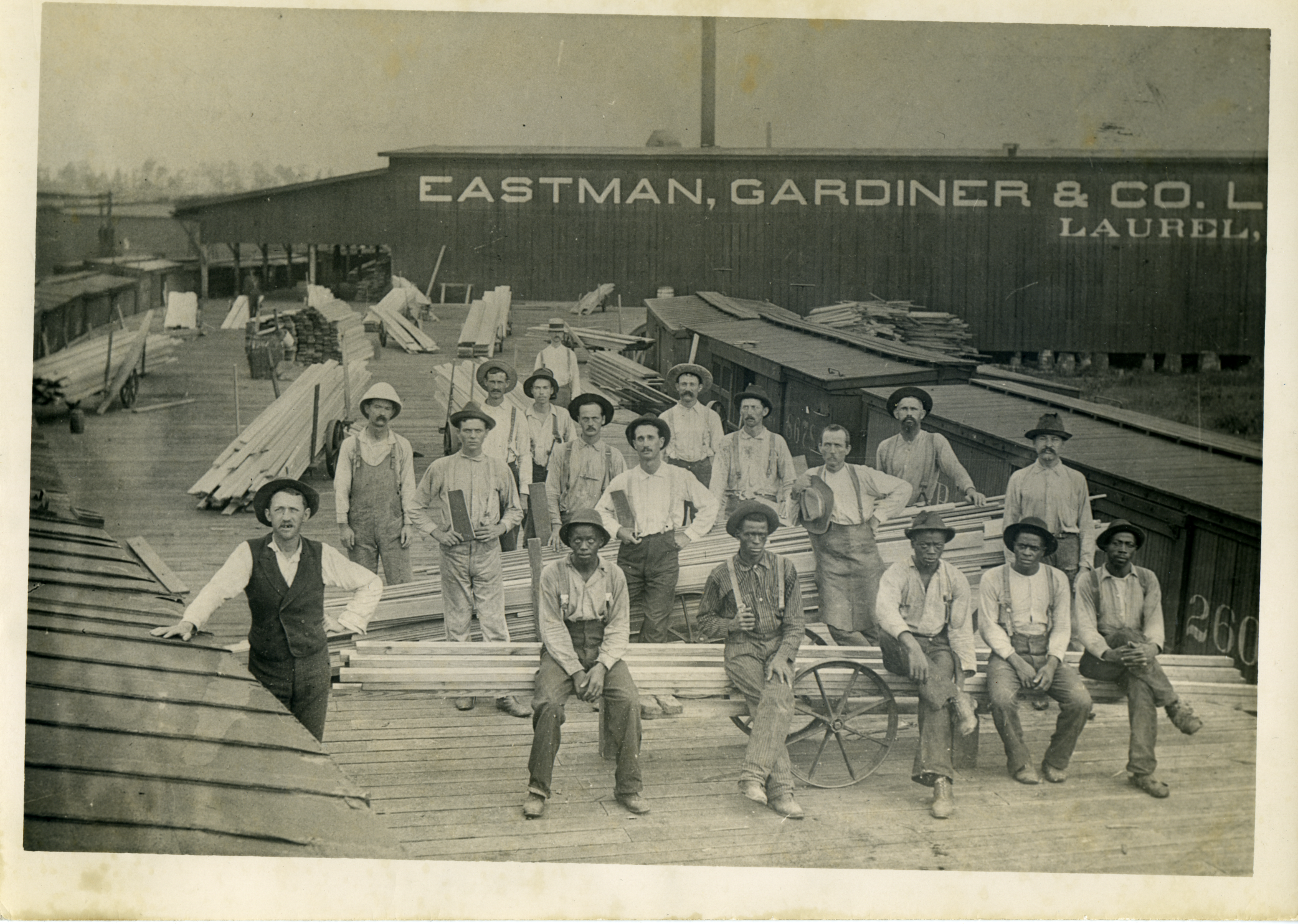
LAUREL'S LUMBER INDUSTRY
Eastman-Gardiner Lumber Company, owned by Lauren Chase Eastman and George and Silas Gardiner, came to Laurel from Clinton, Iowa, and opened their first lumber mill in Laurel in 1893, utilizing the latest technology and labor saving devices. With miles upon miles of virgin yellow pine available, the lumber industry flourished in Jones County and the surrounding area, and three additional sawmills came to Laurel from 1906 to 1914. By the 1920s, Laurel became known as the Yellow Pine Capital of the World. The timber era in Laurel declined with the Great Depression, and all the large sawmills ceased operations in the 1930s.
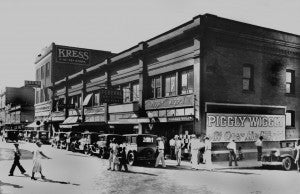
DOWNTOWN LAUREL
Downtown Laurel developed over several stages with the first stores and shops built as temporary wooden structures. As the large lumber companies grew, so did downtown with the construction of brick and concrete businesses on the west side of the railroad and directly north of Eastman-Gardiner Lumber Company. The lumber companies did not own company stores and wanted to encourage the development of downtown businesses and family-owned shops. Schools, churches, a courthouse and city hall also became integral parts of the city center.
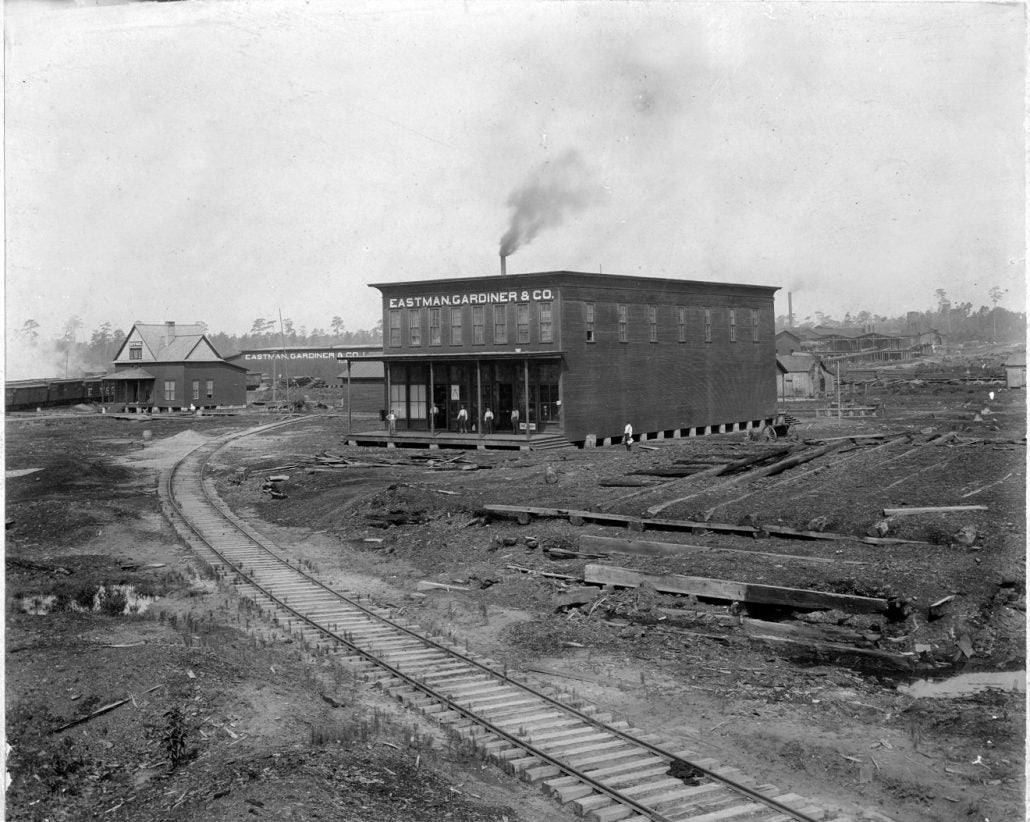
THE RAILROAD
Laurel was incorporated in 1882 once the New Orleans and Northeastern railroad came through the area. Additionally, Laurel had access to a rail line that connected Mobile to Kansas City, providing several directions for lumber to be shipped and connecting Laurel to a large portion of the United States. The large sawmills also had their own trains and rail lines to transport timber back to Laurel for lumber production. By the timber era’s prosperity in the 1920s, Laurel was shipping out one million board feet of lumber daily on rail car. Laurel’s beautiful historic train depot still stands and is used for passenger service and special events.
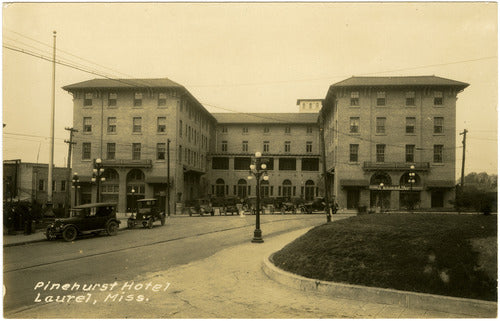
DOWNTOWN CULTURE
Built in 1914, the Pinehurst Hotel was a downtown landmark and the center of activity for Laurel. The Pinehurst was purposely placed directly up the street from the train depot for easy guest access, and it was among the first air-conditioned hotels in Mississippi. Across the street from the Pinehurst, City Hall was constructed in 1914 with a new Post Office built in 1916. An addition to the Pinehurst Hotel in 1927 included the Arabian Theatre which is still in operation today for plays, movies and special events. Sadly, the Pinehurst Hotel was demolished in 1988 due to disrepair, and Pinehurst Park stands in its place.
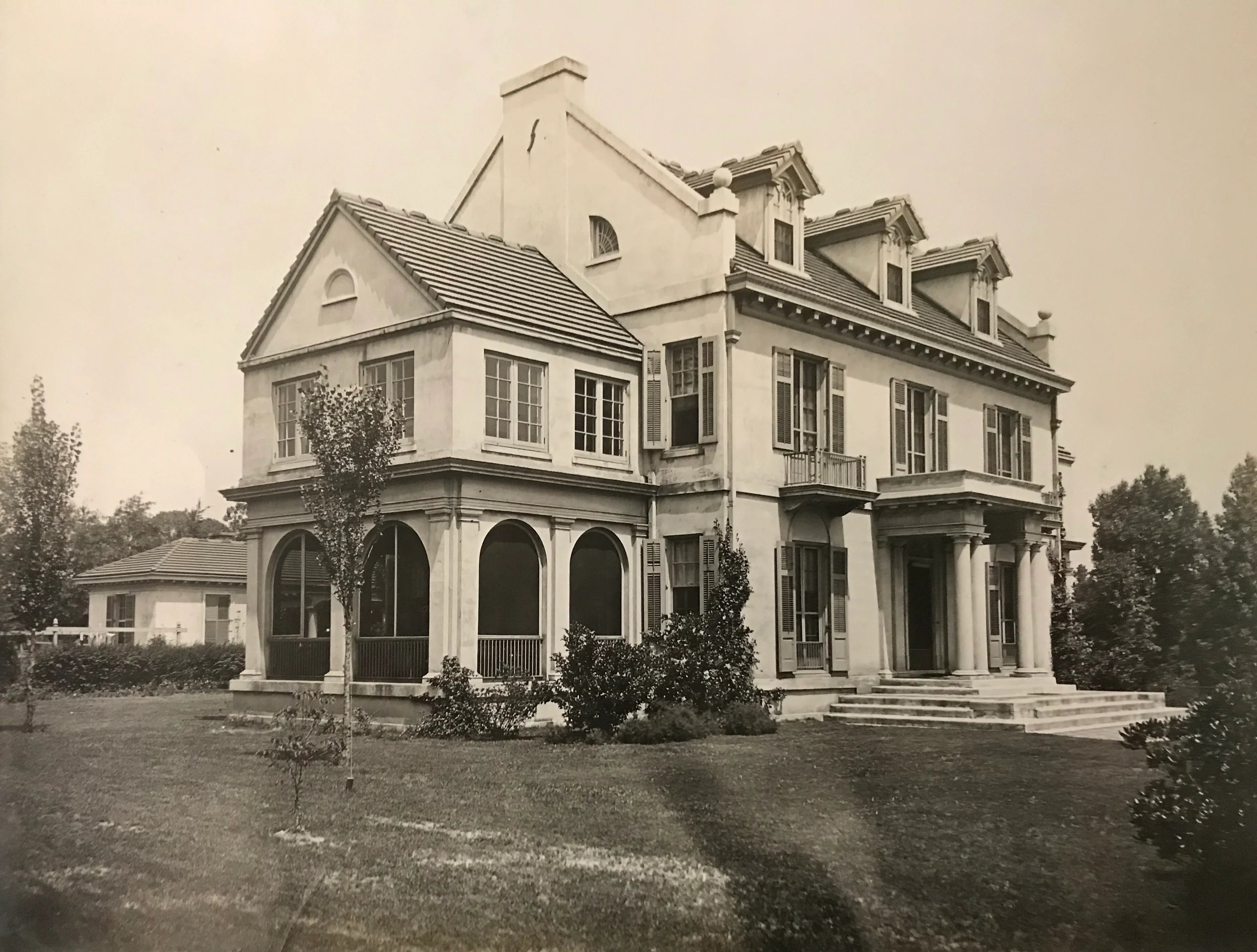
HISTORIC DISTRICT
Laurel’s Historic District is the largest, finest, and most intact collection of early 20th century architecture in Mississippi. Beginning in 1899, stately homes along 5th Avenue were constructed by the lumber barons with development of cottages, bungalows and larger houses on side streets and avenues following quickly. Early on, street cars provided residents access to downtown and to work as well as connecting Laurel to Ellisville. Streets were paved using kiln-fired pine blocks and bricks, and oak trees were planted throughout the area. The district is listed on the National Register of Historic Places and protected by law for future generations to enjoy.
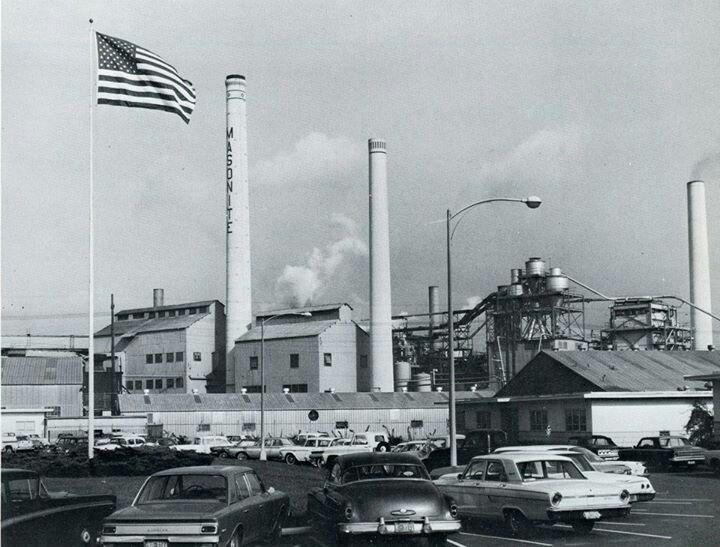
MASONITE
Engineer William H. Mason was brought to Laurel in the 1920s to assist with the vast amount of wood chips and pulp waste produced by the large sawmills. His invention of a hard-pressed board in 1924 led to the formation of Mason Fibre Company, which changed its name to Masonite Corporation in 1928. Masonite quickly grew in the 1930s and 1940s to reach all corners of the globe, and its products were used for a variety of applications including doors, walls, roofing, desktops, flooring, guitar bodies and canoes. To show its appreciation to Mr. Mason, the city of Laurel built and dedicated Mason Park in 1955.
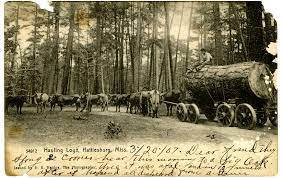
THE LINDSEY WAGON
An indirect by-product of the flourishing timber era was the invention by John Lindsey of the Lindsey Eight-Wheeled Wagon. Patented in 1899, the wagon– really two miniwagons with four axles and eight wheels– revolutionized the timber industry not only in Laurel but also around the world. Before, steam skidders, tractors and trucks, mules and oxen had to pull wagons holding the cut timber logs. These early wagons would bog down in the swamps around Laurel, but the Lindsey Eight-Wheeled Wagon distributed the weight evenly to expedite the process. They were so practical that they were used by the Allies in World War I, and the War Department recognized the Lindsey Wagon Company for distinguished service. The Lindsey Wagon Factory in 1900 was the largest factory under one roof in Mississippi. In 1904, Laurel Machine and Foundry Co. was established for the sole purpose of manufacturing metal parts for the wagon. What’s more, the raw materials entered the factory at one end and the finished wagon left out of the other end, a form of the assembly line several years before Henry Ford pioneered the idea. The wagon displayed here was donated to the City of Laurel by the B.M. Stevens Family. Bobby and Chris Hancock of Hancock Custom Woods Inc. restored its wooden parts. Appropriately, the Laurel Machine and Foundry Co. restored the metal. This rehabilitation occurred through the actions of the Lindsey Log Wagon Committee: Jim Bell, Gene Mulloy, Jimmy Bass, Gordon Myrick, Bobby Hancock, and Chris Hancock. It is now proudly displayed by the Lindsey Family.
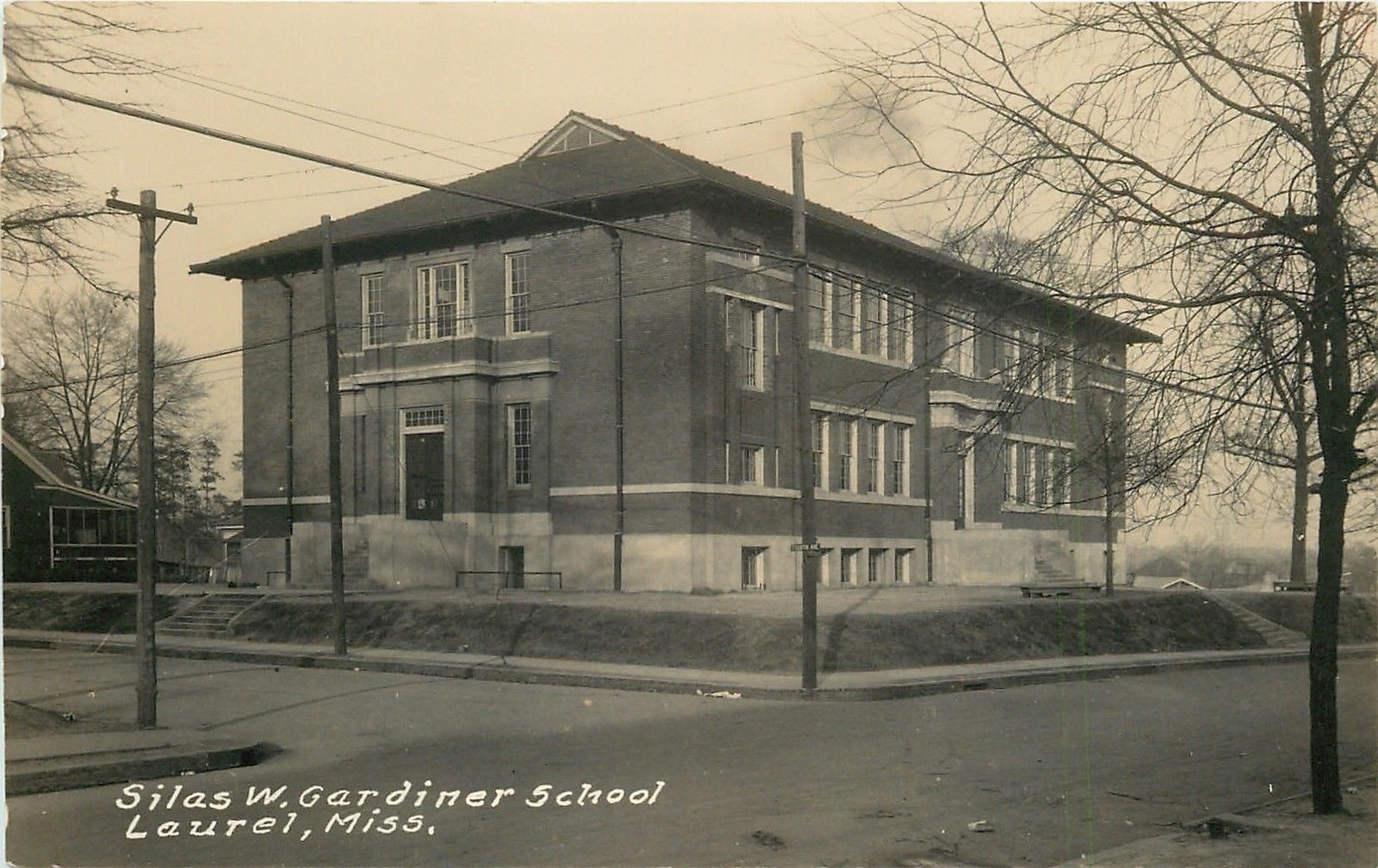
EDUCATION
The value of education was an important component to the success of early Laurel. Schools were built and supported by the large lumber companies who even saw to the construction of Oak Park High School, the first African-American high school in Mississippi. In the early 1900s, Laurel boasted the state’s first kindergarten as well as the formation of a relationship with the University of Chicago to offer classes to local teachers in the summer. Laurel’s historic brick R. H. Watkins Football Stadium, Mississippi’s first lighted football field, was constructed in 1929.
Access Denied
IMPORTANT! If you’re a store owner, please make sure you have Customer accounts enabled in your Store Admin, as you have customer based locks set up with EasyLockdown app. Enable Customer Accounts
